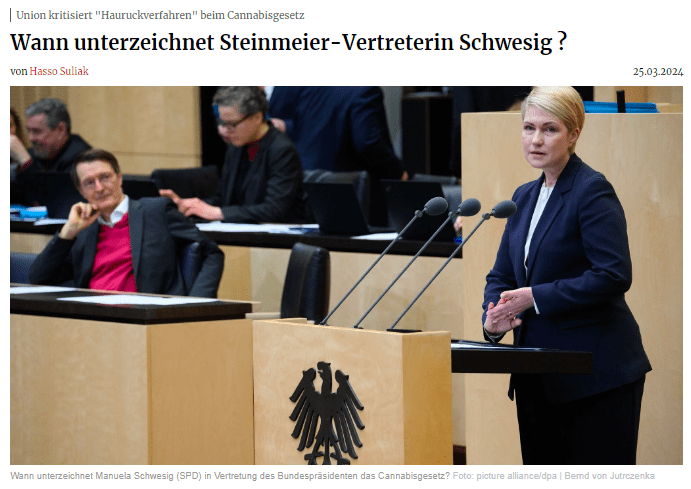This Wednesday witnessed a pivotal moment in German drug policy as the cannabis law, recently passed by the Bundestag, was officially presented to Manuela Schwesig, President of the Bundesrat, for signing. Representing the vacationing Federal President Frank-Walter Steinmeier, Schwesig’s endorsement of the document was anticipated, despite her own expressed reservations. This step marks a historic milestone in Germany’s approach to cannabis, yet it does not come without its controversies and questions. Central to the ongoing debate is a protocol statement from Federal Health Minister Karl Lauterbach, which has ignited discussions among legal experts and throughout the political spectrum.
What Does the Protocol Contain?
The content of the protocol statement, a four-page draft from the Federal Ministry of Health (BMG), remains vague in its scope and direction. No concrete statements have been made regarding the reduction of permissible cannabis quantities or the extension of the distance to daycare centers and schools. Instead, the declaration focuses on intensified efforts in prevention and more controls in connection with the planned cannabis cultivation associations. The ministry promises to anchor these regulations at the federal level before July 1, 2024.
Legal and Political Significance
Constitutional lawyer Prof. Ulrich Battis and expert in party law Prof. Sophie Schönberger agree: A protocol statement has no legal binding. It is rather a political declaration of intent, whose concrete effects and implementation remain uncertain. According to Prof. Alexander Thiele, however, such a statement is a political tool that can help find a compromise in contentious issues. Its effect is therefore political and depends on how it is used and interpreted by the actors.
Implementation in the Federal States
The question of how Lauterbach’s promises to the federal states will be implemented remains open. Especially since the content of the protocol statement may go beyond the regulatory competence of the BMG, there is uncertainty about the practical realization of the announced measures.
Looking to the Future
The protocol statement raises important questions about the future of cannabis policy and regulation in Germany. While some of the measures are to be legally established before July 1, 2024, it remains to be seen how the individual federal states will deal with the guidelines and implement them in practice.
The coming months will show whether the protocol statement by Karl Lauterbach will have a lasting influence on the shaping of the cannabis law or if it will merely be remembered as a political maneuver. In any case, it marks an interesting turning point in the discussion about the legalization of cannabis in Germany and sets the course for an intensive political and societal debate.








